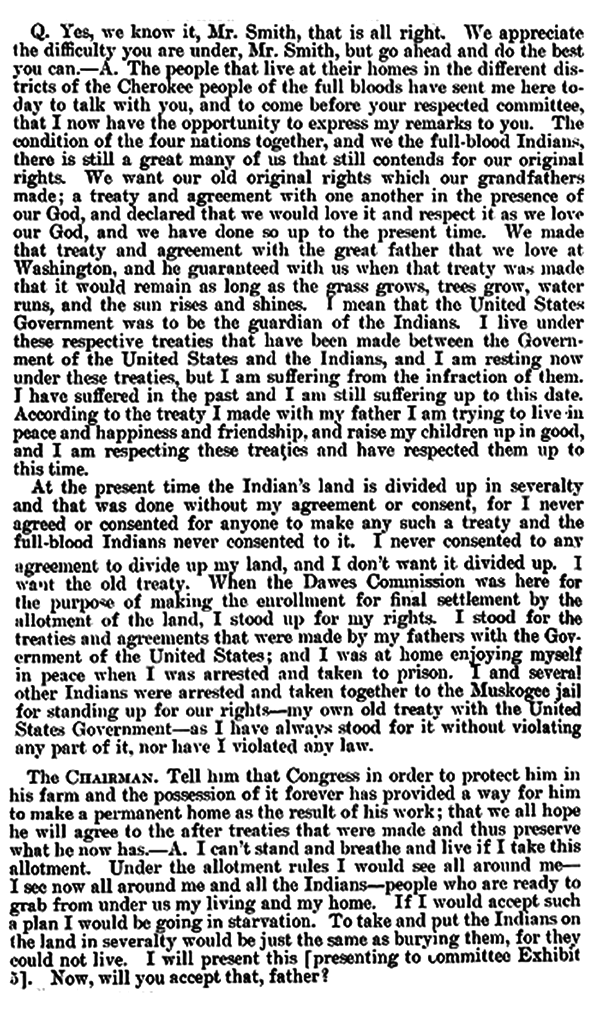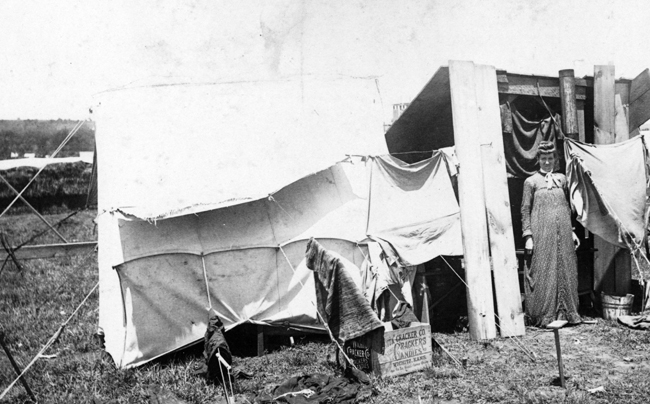
The Opening of Oklahoma
Activities
Justifying an Argument: Allotment Refusal
Many American Indians refused to cooperate with the allotment process. At several points, people who refused their allotment were asked why. These individuals had to explain and justify why they rejected this offer of land. Read the newspaper article about the views of Artus Hotiya and the Senate testimony of Redbird Smith and think about the questions below.
Why does Mr. Hotiya refuse allotment?
Why does Mr. Smith refuse?
Do they share any reasons for their choice? How do they differ?

The Cushing Democrat, June 7, 1906.

Testimony of Redbird Smith. Report of the Select committee to investigate matters connected with affairs in the Indian Territory with Hearings, November 11, 1906–January 9, 1907.
Conducting Research: Tribal Perspectives Today
Although the Dawes Act and allotment are considered to be policies that negatively impacted the tribes, these nations managed to survive into the current century. Many of these nations operate websites that present these historical events from their perspective. Follow the links on this page to learn how different tribes present their ancestors’ experiences during the allotment period.
Absentee-Shawnee Tribe of Indians of Oklahoma
Alabama-Quassarte Tribal Town
Apache Tribe of Oklahoma
Caddo Nation of Oklahoma
Cherokee Nation
Cheyenne and Arapaho Tribes
Chickasaw Nation
Choctaw Nation of Oklahoma
Citizen Potawatomi Nation
Comanche Nation
Delaware Nation
Delaware Tribe of Indians
Eastern Shawnee Tribe of Oklahoma
Fort Sill Apache Tribe
Iowa Tribe of Oklahoma
Kaw Nation
Kialegee Tribal Town
Kickapoo Tribe of Oklahoma
Kiowa Indian Tribe of Oklahoma
Miami Tribe of Oklahoma
Modoc Nation
Muscogee (Creek) Nation
The Osage Nation
Ottawa Tribe of Oklahoma
Otoe-Missouria Tribe of Indians
Pawnee Nation of Oklahoma
Peoria Tribe of Indians of Oklahoma
Ponca Tribe of Oklahoma
Quapaw Tribe of Indians
Sac and Fox Nation
Seminole Nation of Oklahoma
Seneca-Cayuga Nation
Shawnee Tribe
Thlopthlocco Tribal Town
Tonkawa Tribe of Indians of Oklahoma
United Keetoowah Band of Cherokee Indians in Oklahoma
Wichita and Affiliated Tribes
Wyandotte Nation
Practicing Evidence-Based Writing: Settler Interviews
In the 1930s, the government paid writers to develop an archive called the Indian Pioneer Papers. Containing thousands of interviews, this collection offers insight into the social history of Oklahoma before statehood. You can search this collection at https://digital.libraries.ou.edu/whc/pioneer/.
Locate five interviews that document the land runs. As you read them, consider what they have in common. For example, do most of them describe a particular challenge (lack of resources, disorganization) or topic (family, food)? If there is agreement, then that element is likely key to understanding the event and experience. Once you have examined these records, write one of the following:
- Historical fiction—a fictional account will take the elements that are most likely to be a part of a historic event and places them in an imaginative, created story.
- Non-fiction—select the shared experience or detail and do additional research. Write a short essay about the importance of the shared experience or detail. Be sure to include the basic facts (who, what, where, when, how, and why), the broader context, and the significance.

You may find that the participants in the runs frequently describe their living arrangements. A woman holding down a claim on a town lot in Guthrie, Oklahoma Territory, following the Land Run of 1889 (15727, D. S. Mitchell Collection, OHS).

